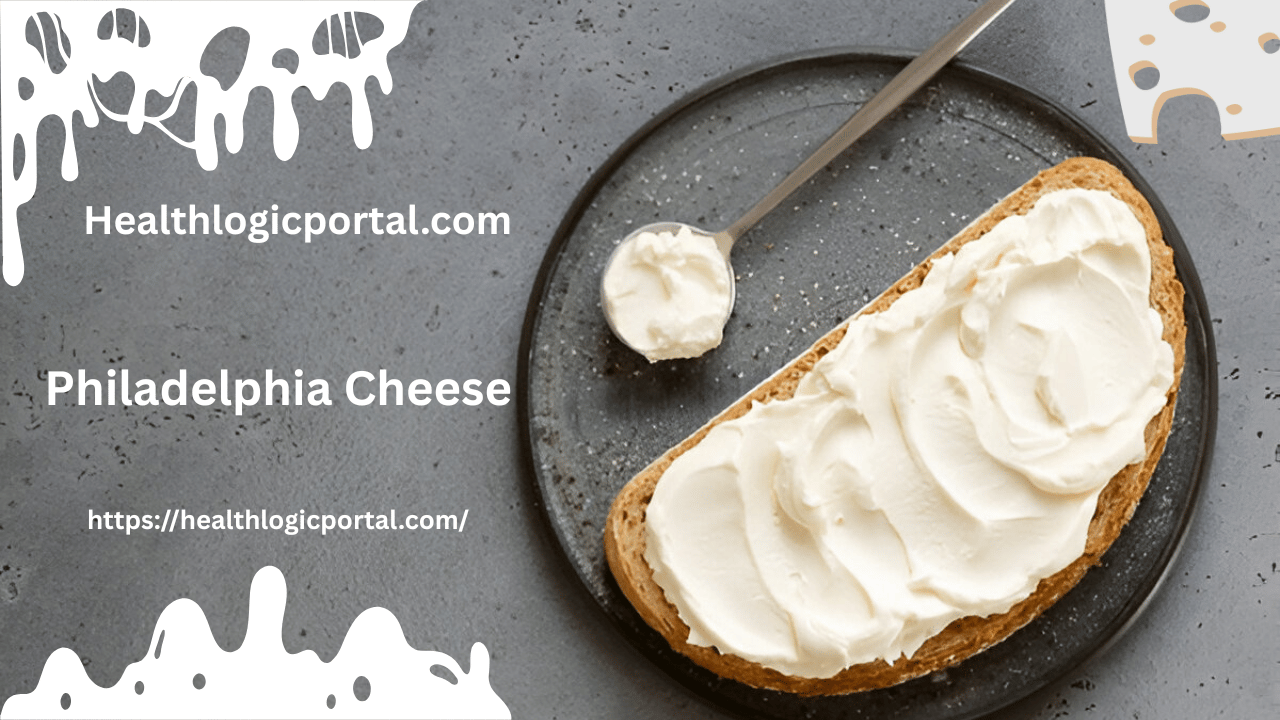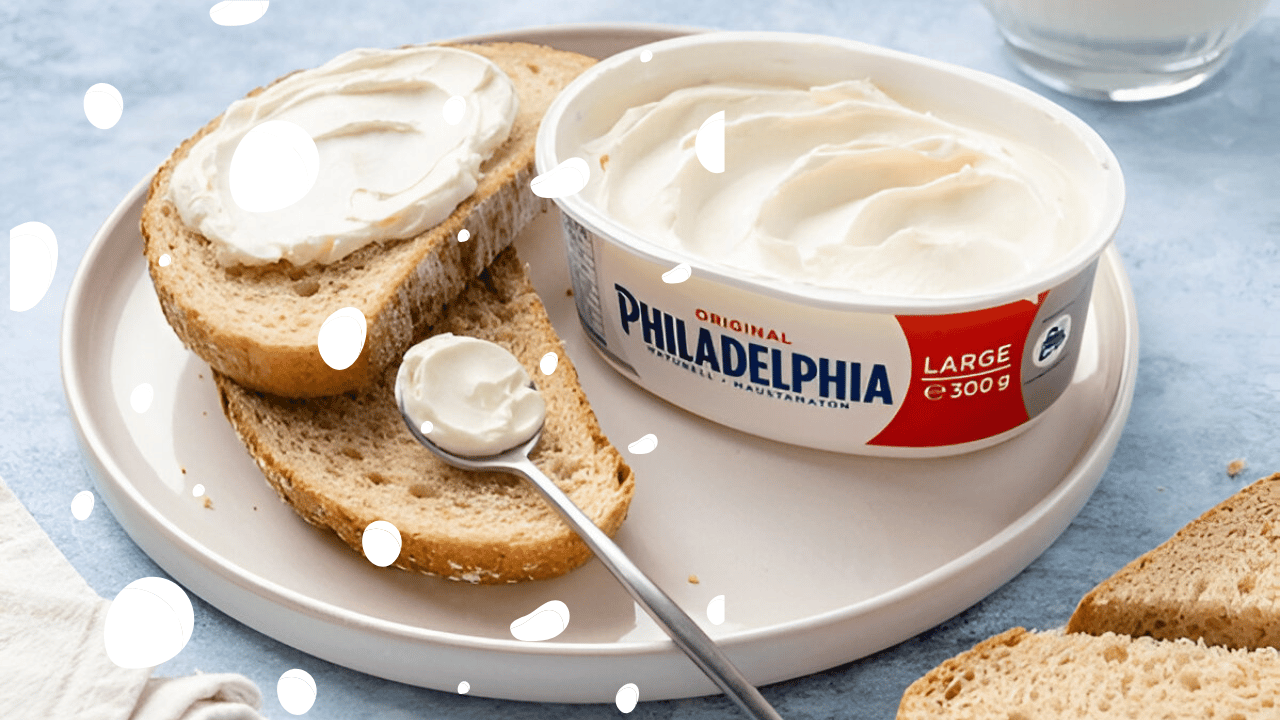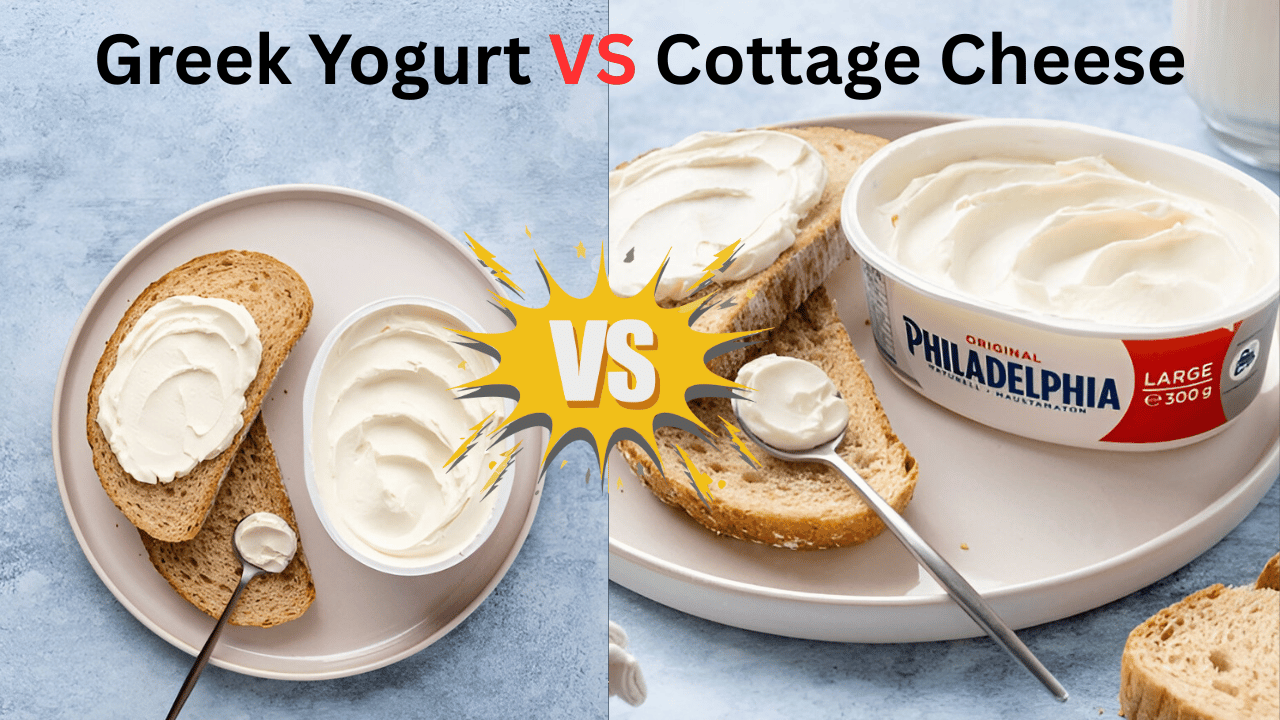Philadelphia cheese, famously known as cream cheese, has become a kitchen staple worldwide. Whether it’s spread on a warm bagel on a busy morning, whisked into a cheesecake for Sunday dessert, or used as the creamy base of a party dip, its smooth texture and mild, tangy flavor are almost irresistible.
Originally developed in the late 19th century in New York, this cheese quickly became one of the most beloved dairy products, particularly in the U.S. and Europe. Food historians even note that it was marketed as a luxury cheese, making it one of the first branded food products to gain household recognition.
But here’s the real question many of us ask: Is Philadelphia cheese actually healthy? While it’s undeniably delicious, its reputation has sparked debate—some see it as a guilty pleasure packed with fat, while others argue it can fit into a balanced diet when eaten in moderation.
Like most foods, the truth isn’t black and white. Your health outcome depends on how often you eat it, portion sizes, and what you pair it with. For example, spreading it lightly on whole-grain toast with veggies is very different from layering it into a heavy cheesecake.
The rise of health-conscious eating has made people more mindful of what’s on their plate. Just as questions pop up around probiotic drinks like Yakult, it makes sense to take a closer look at Philadelphia cheese too. By examining its nutritional profile, potential benefits, risks, expert opinions, and even healthier alternatives, you’ll be able to decide whether it deserves a spot in your daily diet or just an occasional treat.
So, the next time you swirl Philadelphia into pasta sauce or add a dollop on your toast, you’ll know exactly what it means for your health.
Understanding Philadelphia Cheese

Philadelphia cheese isn’t your traditional hard cheese like cheddar or Parmesan. Instead, it falls under the soft, fresh cheese category. Unlike aged cheeses, cream cheese is made to be consumed fresh, giving it that signature smooth and creamy texture.
At its core, Philadelphia cheese is made from pasteurized milk and cream, which undergoes a fermentation process using lactic acid bacteria. This fermentation thickens the mixture, giving cream cheese its characteristic tangy flavor. Additional stabilizers are often added to maintain its smooth consistency and extend shelf life.
One thing that sets Philadelphia cheese apart is its branding. While “cream cheese” is a general term, the Philadelphia brand has become almost synonymous with cream cheese itself. Many people don’t even say cream cheese—they just say “Philadelphia.” That’s the power of marketing and consistency in quality.
From a culinary perspective, Philadelphia cheese is incredibly versatile. It can be spread on bread, whipped into frostings, stirred into sauces, or even used as a healthier substitute for butter in some recipes. Unlike mayonnaise, which is purely fat-based, cream cheese provides a balance of fat, protein, and some essential nutrients.
Of course, the real question is whether these nutrients outweigh the potential downsides. After all, not all cheeses are created equal. Just like you might compare honeycomb benefits for health to understand its true value, the same careful evaluation is necessary for Philadelphia cheese.
When looking at health, it’s important to remember that no single food is “good” or “bad.” Instead, it’s about how it fits into your overall dietary pattern. Eat it excessively, and it may cause problems. Consume it wisely, and it can be part of a nutritious, balanced lifestyle.
Nutritional Profile of Philadelphia Cheese
Before labeling Philadelphia cheese as healthy or unhealthy, we need to break down its nutritional profile. Here’s a look at what you get in one typical serving (about 2 tablespoons or 30 grams) of original Philadelphia cream cheese:
Nutrient Amount per 30g serving
- Calories 100–110 kcal
- Protein 2 grams
- Total Fat 10 grams
- Saturated Fat 6 grams
- Carbohydrates 1–2 grams
- Sugars 1 gram
- Sodium 90–100 mg
- Calcium 28 mg (approx)
Philadelphia cheese is undeniably rich and creamy, but that comes with a trade-off—it’s high in fat, and much of that fat is saturated. While fats are essential for energy, cell function, and hormone regulation, too much saturated fat can raise LDL (“bad”) cholesterol, which is linked to a higher risk of heart disease over time.
Philadelphia cheese does have its redeeming qualities. It contains protein, which supports muscle repair, and calcium, which plays a vital role in bone strength. Still, compared to firmer cheeses like cheddar or gouda, the protein levels in cream cheese are on the lower side.
When you stack it against common spreads, Philadelphia often lands in the middle ground. It has less fat than butter but offers more nutrients than mayonnaise. That balance makes it a versatile option—especially if you’re looking for something creamier than yogurt but lighter than butter.
For those keeping an eye on calories or cholesterol, Philadelphia also offers light and reduced-fat versions. These alternatives can significantly cut fat and calorie intake while still giving you the familiar taste and texture.
So, nutritionally speaking, Philadelphia cheese isn’t a “superfood” like soursop leaves with their many health benefits, but it isn’t necessarily a villain either. It’s somewhere in the middle—neutral, depending on how you consume it.
Is Philadelphia Cheese Healthy? 3 Benefits

Is Philadelphia cheese healthy? Believe it or not, Philadelphia cheese does offer some health benefits as long as you don’t overdo it. Let’s break them down:
1. Good Source of Protein and Energy
While it’s not as protein-rich as cottage cheese or Greek yogurt, Philadelphia cheese still provides a small but useful amount of protein. This makes it a quick energy-boosting snack when paired with whole-grain bread or vegetables.
2. Contains Calcium for Bone Health
Calcium is one of the most important minerals for maintaining strong bones and teeth. Even though Philadelphia cheese doesn’t have as much calcium as hard cheeses, it still contributes to your daily intake. For people who don’t consume a lot of dairy, every little bit helps.
3. Can Be Part of a Balanced Diet
The key word here is moderation. If you’re mindful of portions, Philadelphia cheese can be a satisfying way to add flavor and creaminess to your meals without going overboard on calories. For example, spreading a thin layer on whole-grain toast with fresh fruit on top creates a balanced snack.
Potential Health Risks of Philadelphia Cheese
While Philadelphia cheese has its benefits, it also carries health risks when consumed in large amounts. Understanding these risks helps you enjoy it wisely without compromising your health.
1. High in Saturated Fats and Cholesterol
Philadelphia cheese is high in saturated fats, with about 6 grams per serving. Excess saturated fat intake is directly linked to an increase in LDL cholesterol, often referred to as “bad cholesterol.” Over time, this can lead to plaque buildup in arteries, raising the risk of heart disease and stroke. For individuals already struggling with cholesterol issues, frequent consumption may worsen their condition.
2. Sodium Content and Its Impact on Blood Pressure
Another risk is the sodium content. While a single serving may not seem like much, many people don’t stop at just one. Sodium contributes to high blood pressure, a major factor in cardiovascular disease. Combined with other salty foods in your diet, Philadelphia cheese can tip the balance toward unhealthy sodium levels.
3. Weight Gain Concerns with Overconsumption
At around 100 calories per two tablespoons, cream cheese may not seem calorie-dense—but it’s easy to eat much more than that. Spread thickly on bagels or baked into cheesecakes, those calories add up quickly. Over time, this can lead to weight gain, especially if your overall diet lacks balance.
Is Philadelphia Cheese Healthy for Weight Loss?

When people talk about weight loss, cream cheese often sparks debate. Can it fit into a calorie-conscious diet, or does it sabotage your efforts? The answer lies in portion control and food pairing.
Philadelphia cheese is calorie-dense, so eating large portions can quickly exceed your daily limits. But here’s the twist—if used wisely, it can still play a role in weight loss diets. For example, spreading a thin layer of reduced-fat Philadelphia on a slice of whole-grain toast with cucumber slices provides a filling snack that balances protein, fat, and fiber.
Philadelphia cheese can fit into a weight-loss diet, but only if you use light versions, practice portion control, and balance it with fiber-rich foods.
Philadelphia Cheese vs Other Spreads
When deciding whether Philadelphia cheese is a healthy choice, it helps to compare it with other popular spreads.
Philadelphia Cheese vs Butter
Butter is almost pure fat, with little to no protein or beneficial nutrients. Compared to butter, Philadelphia cheese contains fewer calories and less saturated fat per serving. It also provides some protein and calcium. So, if the choice is between buttering your toast or spreading a thin layer of cream cheese, Philadelphia wins in terms of nutrition.
Philadelphia Cheese vs Mayonnaise
Mayonnaise is high in fats and often contains added sugars and preservatives. While it’s delicious in sandwiches, it doesn’t offer much nutrition. Philadelphia cheese, on the other hand, offers protein and a small amount of calcium, making it the better option. However, mayonnaise is sometimes lower in saturated fat depending on the brand, so both need moderation.
Who Should Avoid Philadelphia Cheese?
While many people can enjoy Philadelphia cheese in moderation, there are groups who should be extra cautious or avoid it altogether.
People with Lactose Intolerance
Since Philadelphia is made from milk and cream, it contains lactose. While the amount is lower than in regular milk, it can still cause digestive issues like bloating, cramps, and diarrhea in people sensitive to lactose.
Individuals with Heart Health Concerns
If you have high cholesterol, heart disease, or hypertension, Philadelphia cheese can add unnecessary saturated fat and sodium to your diet. These are precisely the nutrients you’re advised to limit for cardiovascular health.
Patients with High Cholesterol
People trying to lower LDL cholesterol should be cautious. Even though Philadelphia cheese contains some protein and calcium, its fat profile may work against heart health goals if consumed regularly.
In the same way people avoid certain foods listed among the worst for prostate health, individuals with these conditions should limit cream cheese or switch to lighter alternatives.
How to Make Philadelphia Cheese Healthier in Your Diet
The good news is, you don’t have to cut Philadelphia cheese out completely. Instead, you can enjoy it in smarter, healthier ways.
1. Pairing with Fruits and Vegetables
Instead of spreading it on bagels or pastries, try pairing Philadelphia cheese with fresh produce. For instance, celery sticks with a light layer of cream cheese make a crunchy, satisfying snack. Strawberries dipped in whipped Philadelphia cheese are another creative option.
2. Healthy Portioning Tips
Use a knife or spoon to measure your serving size—about two tablespoons is plenty. Spreading it thinly on whole-grain bread provides flavor without excess calories.
3. Choosing Reduced-Fat Versions
Philadelphia offers reduced-fat and whipped varieties, which cut calories and fat nearly in half. These options make it easier to fit cream cheese into a balanced diet without overloading on saturated fat.
By making these small adjustments, you can enjoy the creamy taste without harming your health goals.
Healthy Recipes Using Philadelphia Cheese

Philadelphia cheese isn’t just for bagels and cheesecakes—it can actually be incorporated into healthier recipes if you know how to use it wisely. Instead of loading it into calorie-heavy desserts, you can use it in balanced meals and snacks.
Breakfast Ideas
Start your day with something light yet filling. Spread a thin layer of Philadelphia cheese on whole-grain toast and top it with sliced avocado. This combination balances protein, healthy fats, and fiber, keeping you satisfied longer. Another option is blending Philadelphia cheese with Greek yogurt to create a creamy topping for fruit bowls or overnight oats.
Snack Recipes
Instead of potato chips or candy, pair Philadelphia cheese with veggie sticks like carrots, celery, and cucumbers. The creaminess complements the crunch, making for a nutrient-rich snack that’s satisfying without being overly heavy. You can also use it as a dip by mixing it with herbs and a splash of lemon juice.
Dinner Recipes
For dinner, Philadelphia cheese can be used to create lighter sauces. Instead of heavy cream, add a spoonful of Philadelphia to pasta sauces for creaminess without too much fat. Baked chicken breasts stuffed with spinach and a little cream cheese also provide a protein-packed, flavorful meal.
When used thoughtfully, Philadelphia cheese can elevate simple dishes into satisfying, health-conscious meals. Just like adding soursop leaves for their many health benefits can enrich your diet, incorporating cream cheese in moderation can do the same—minus the guilt.
Expert Opinions on Philadelphia Cheese
Nutritionists and health experts tend to agree on one thing: Philadelphia cheese isn’t harmful if consumed in moderation. However, they caution against treating it as a daily dietary staple.
Most dietitians emphasize that the problem isn’t cream cheese itself but rather how people consume it. A tablespoon spread on toast a few times a week is fine, but several scoops in cheesecakes, dips, and pasta dishes every day can contribute to health issues.
Health organizations such as the American Heart Association warn against excessive saturated fat, which Philadelphia cheese contains. But they also highlight that occasional indulgence isn’t likely to cause harm if your overall diet is balanced with fruits, vegetables, lean proteins, and whole grains.
Experts Philadelphia cheese recommend treating it as a treat or flavor enhancer rather than a major nutrient source.
How does Philadelphia cheese fit into different diet plans?
Keto Diet
Philadelphia cheese is often recommended in keto recipes because it’s high in fat and very low in carbs. It can be used in fat bombs, sauces, and desserts without kicking you out of ketosis. For keto followers, it’s actually a convenient ingredient.
Mediterranean Diet
This diet emphasizes whole foods, healthy fats, and limited processed foods. While Philadelphia cheese doesn’t exactly fall under the whole food category, a small amount can still fit into Mediterranean-style eating as long as it’s balanced with vegetables, olive oil, and lean proteins.
Vegetarian Diet
Philadelphia cheese is naturally vegetarian since it doesn’t contain animal rennet. Vegetarians can use it in a variety of dishes, from veggie wraps to pasta sauces, as a way to add richness without meat.
Cream cheese doesn’t fit well into strict vegan diets. For those, plant-based cream cheese alternatives made from cashews, soy, or almonds are available.
So, while Philadelphia cheese may not be the star of any health-focused diet, it can still be adapted into many meal plans if used wisely.
Alternatives to Philadelphia Cheese

If you love creamy spreads but want something healthier or lower in fat, there are plenty of alternatives to Philadelphia cheese.
Greek Yogurt
Thick, tangy, and protein-rich, Greek yogurt can be used as a spread, dip base, or topping. It offers far more protein than cream cheese and contains beneficial probiotics for gut health.
Cottage Cheese
Another great option is cottage cheese. It’s lower in fat and calories while being rich in protein. You can blend it for a smoother texture that resembles cream cheese.
Final Verdict – Is Philadelphia Cheese Healthy?
So, is Philadelphia cheese healthy? The honest answer: it depends on how you use it. Philadelphia cheese is not a superfood—it’s not packed with antioxidants or fiber like fruits and vegetables. But it’s also not a nutritional villain.
In moderation, it can add flavor, texture, and satisfaction to meals without ruining your health goals. The risks come when you eat it excessively, especially if you already have concerns about cholesterol, heart health, or weight management. If you consume it daily in large portions, you might face the same issues linked to other high-fat, processed foods.
Conclusion
Philadelphia cheese is one of those foods that sparks endless debate. On one hand, it’s creamy, delicious, and versatile—turning plain bagels, dips, and sauces into comfort food favorites. On the other hand, it’s high in saturated fat and calories, making it less than ideal if consumed in excess.
Philadelphia cheese is not inherently unhealthy, but it’s not a nutritional powerhouse either. It’s a neutral food that can lean toward healthy or unhealthy depending on how you use it. Pair it with fruits, veggies, and whole grains in small portions, and it can be a satisfying part of your diet.
If you’re aiming for weight loss, cholesterol management, or heart health, you’ll want to stick to light versions or healthier alternatives like Greek yogurt or cottage cheese. But if you’re simply looking for balance in your diet, a little Philadelphia cheese won’t derail your efforts.
FAQs
1. Is Philadelphia cheese processed food?
Yes, Philadelphia cheese is considered a processed dairy product because it contains stabilizers to maintain texture and extend shelf life. However, it’s less processed than heavily refined spreads like margarine or packaged dips.
2. Can I eat Philadelphia cheese every day?
Eating small portions occasionally is fine, but consuming Philadelphia cheese daily in large amounts isn’t ideal due to its high saturated fat and sodium. A few tablespoons a week as part of a balanced diet is generally safe for most people.
3. Is Philadelphia cream cheese healthier than butter?
Yes, in most cases. Butter is almost pure fat with no protein or calcium, while Philadelphia cheese has slightly fewer calories and offers some protein and calcium. If you choose between the two, Philadelphia cheese is often the better option.
4. Does Philadelphia cheese help in weight loss?
Not directly. Philadelphia cheese is calorie-dense, so it can hinder weight loss if eaten in large portions. However, if you use light versions and practice portion control, it can fit into a weight-loss diet, especially when paired with fiber-rich foods.
5. Is it safe for children?
Yes, children can safely eat Philadelphia cheese in moderation. It provides calcium and protein, but parents should limit portions to avoid excess fat and sodium. Pairing it with whole-grain crackers, fruits, or veggies makes it a healthier option for kids.


